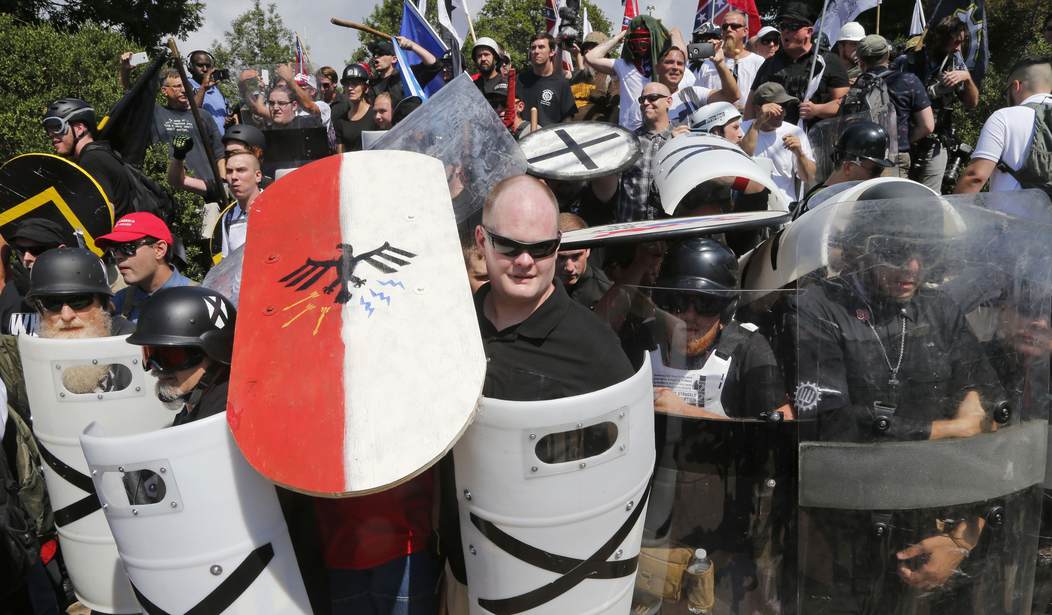Bethany Mandel, who was attacked online regularly by white nationalists last year for criticizing Trump, is getting attacked online today by leftists for gently suggesting that … engaging with someone on a human level is a good way to disarm their prejudices. Phrased that way, I’d like to think even knee-jerk progressives would recognize her approach as basic wisdom. But, for understandable reasons, Nazis and white supremacists are widely viewed as among the most diabolical characters in American life, and you don’t try to “get to know” demons. You cast them out. To her detractors, Mandel’s dancing with the devil here.
Her rejoinder: What if you can’t cast them out? They’re not going anywhere. If you want to thin the ranks, a little kindness goes a long way.
[Daryl] Davis is African American, and his MO is this: He meets with white supremacists from around the country and asks them one question: “How can you hate me if you don’t even know me?”
In other words, he starts by listening. “Give that person a platform; let them air their views, and they will reciprocate,” he explains.
It’s a novel idea in this age of the Donald Trump administration to listen to anyone we disagree with – especially so with white supremacists. But with his technique, Davis has achieved the impossible. He has convinced two hundred members of the KKK and other white supremacist groups to renounce their views.
As chance would have it, WaPo has a story out this afternoon with another anecdote that supports Mandel’s thesis. A C-SPAN caller who phoned in last year to tell an African-American guest that he was prejudiced kept in touch with her after they chatted on air. A year later:
On Friday morning, near the end of a Washington Journal conversation about NFL player Colin Kaepernick kneeling during the national anthem last year, Garry Civitello called back into C-SPAN to share how that brief televised exchange with McGhee — which went viral last summer after The Washington Post wrote about it — had changed him.
He said he and McGhee have spoken by phone many times and are “personal friends.” What has helped him change his prejudices, he said, was open communication with people of other races as well as reading black history.
“There are so many things I did not know that I thought I knew,” he said. “I depended on the media for my information. I looked at television shows like ‘Cops’ and ‘Gangland’ and these programs that portray minorities in a negative way. I don’t have the opportunity to come from a diverse area. I live in the rural South.”
If there was any doubt that personal contact softens hard feelings, and there shouldn’t be if you’ve ever interacted with anyone ever, here’s a bit of data from a 2009 poll on gay marriage. Support for same-sex marriage was still a minority position at the time but Gallup noticed an interesting divide between people who personally knew someone who’s gay and people who didn’t (or thought they didn’t):

When Gallup asked whether gay “relations” should be legal, people who personally knew someone gay split 67/29 in favor while people who didn’t split 40/57 against. You can’t quite prove causation there between knowing gays and supporting gay marriage since it’s possible that people who support gay rights are telegraphing their views in ways that make them more approachable to gay people. (I.e. in some cases backing SSM might increase your odds of meeting someone gay.) Some of the data may also be byproducts of geography: Cities are known to be more liberal than rural areas, which in turn attracts straight liberals as well as gays who are seeking a more welcoming environment. Once they’re in the same city, the two groups bump into each other, creating what appears to be a causal connection between personal relationships and support for SSM. All of that said, though, it surely is the case for some that getting to know gays personally, seeing them around their significant others, and getting comfortable with them softened their views of gay marriage. Mandel’s just extending that logic to people with vicious prejudices.
So why do people resist this tactic, especially knowing Daryl Davis and others have had bona fide success getting white supremacists to rethink their views by talking to them? For some I assume it’s sheer, insurmountable revulsion at Nazi views; Mandel herself admits she probably couldn’t execute this strategy on a gut level. For others it may be a strategic instinct that so long as the number of white supremacists is (relatively) small, there’s no need to kill them with kindness to put pressure on them to change their views. More pressure can be applied through old-fashioned hostility and ostracization: Make them aware that no one except other Nazis will have anything to do with them and they’ll be forced to make a hard choice about how much they want to sacrifice in the name of racism. That leaves you with a question, though: Is there hypothetically some point at which neo-Nazi numbers could grow large enough that Mandel’s “human engagement” strategy would become more effective than ostracization in changing their minds? Or would a bigger Nazi population make personal engagement less effective? The more fellow Nazis there are for them to associate with, the less they may care about talking to people outside their own ranks.
Something for social media sites to think about, though. Lately they’ve taken to expelling racists — casting out demons — to disassociate themselves from bigotry. (Even dating sites.) If Mandel’s right, the shrewder strategy would be to leave their accounts intact but prevent them from interacting with anyone else who’s expressing racist views. Force them to chat only with people who are different and maybe they’ll soften up.








Join the conversation as a VIP Member